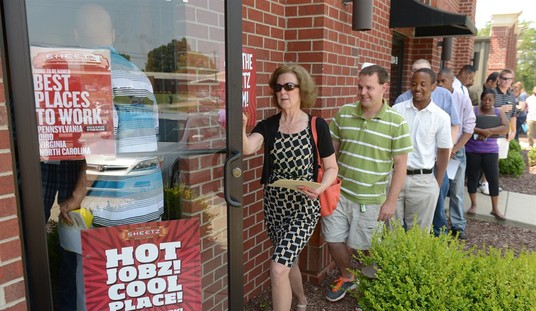I’m reasonably certain this is not a prank, because the Wall Street Journal doesn’t usually run gag articles, outside of April Fool’s Day. The title of this one is enough to make you gag: “Should You Bring Mom and Dad to Your Job Interview?”
Millennials—people born between 1981 and the early 2000s—are much closer to their parents than previous generations, and they have gained a reputation for being coddled by so-called helicopter parents, say researchers who study Millennials. But when they started joining the workforce in the early 2000s, managers balked at parents getting involved in their kids’ workplace struggles or job searches.
That was then. Now, some firms have begun embracing parental involvement and using it to attract and hold onto talent and boost employee morale.
One of them is Northwestern Mutual. Michael Van Grinsven, field-growth and development director at the Milwaukee-based financial firm, says the company does everything it can to accommodate the parents of college-aged interns, including regularly inviting them to the office for open houses.
“It’s become best practice,” Mr. Van Grinsven says, noting that parents can influence their children’s career decisions. Some Northwestern Mutual managers call or send notes to parents when interns achieve their sales goals and let parents come along to interviews and hear details of job offers. They may even visit parents at home.
I’m going to throw this one out to the crowd: is anybody else but me creeped right the hell out by this? Is anybody younger than me troubled by this notion? (I’m just old enough to start reading my junk mail from AARP and glancing nervously at the calendar.)
I don’t suppose there’s anything wrong with the parents of a few younger workers showing up at office parties now and then, although I can’t recall that happening very often in my own work history. But this goes much farther. In case you were wondering, yes, there are “Take Your Parents to Work Days” now.
Supposedly America is lagging behind the rest of the world in parental workforce involvement:
It may be on the rise, but parental involvement in the U.S. doesn’t begin to match countries in Asia and South America, according to a 2013 study from the global accountancy firm PricewaterhouseCoopers LLP.
The study, which surveyed 44,000 people from more than 20 countries, found that just 6% of recent college graduates surveyed in the U.S. wanted their parents to receive a copy of their offer letters. That’s well below the global average of 13% and much less than some other countries, where it was as high as 30%. The study also found that just 2% of young employees in the U.S. want their parents to receive a copy of their performance review, compared with the global average of 8%.
But not everyone in corporate America is on board with bringing Mom and Dad into office life:
Still, the attention paid to parents has put some employers in an awkward position. “This is a situation that’s odd and uncomfortable to say the least,” says Jaime Fall, a vice president of the HR Policy Association.
For example, HR executives have to follow privacy policies that prevent them from sharing information with parents. That can be a problem when a parent calls asking why their offspring didn’t get a job or wants to negotiate salary, Mr. Fall explains.
Parental involvement also isn’t for everyone. Lauren Bailey, a 22-year-old graduate of the State University of New York at Albany, says that if a company gave her a letter to take home to her parents, “I would almost feel like I was back in high school.”
Nor can she imagine taking her parents to an interview or a company recruiting event. “I’d be worried that they’d be speaking for me,” she says. “I know I’m young, but at some point I have to make my own decisions.”
I don’t want to come off like an old fuddy-duddy here, but it seems to me that some of the traits employers value – independence, resourcefulness, initiative – are undermined by bringing parents into the office, not to mention involving them in job interviews. I’m a big proponent of the importance of family, and its value for putting young people on the road to success, but at some point you’ve got to leave the nest.
It’s also not a good idea to encourage the new social trend of extended adolescence. The current American culture is quite impatient with childhood – they’re working on sex-ed classes for five-year-olds in Chicago – but it wants to drag adolescence out as long as possible. The life of the college student will now extend into the early years of career life, where company functions increasingly resemble PTA meetings. Couple this with the growing trend of young people living with their parents for an uncomfortably long time, and it’s getting hard to see where “adulthood” really begins.
Not only is it a good idea to bring the assets of independence and resourcefulness to job interviews, but working life is an important part of the maturing process. Young people grow up a lot during both their school jobs and early career positions. An uncomfortable degree of parental involvement will disrupt that process.
And if there’s one thing American desperately needs a lot more of, it’s growing up. The level of childishness and dependency in our current population is disturbing. The old signposts of maturity have been blurred. The public mind displays many childish traits: impatience, short attention span, lack of self-discipline, a preference for emotional stimulation over rational argument, difficulty planning for the future… and these traits are indulged, even celebrated.
Young people are not well-served by growing up into a culture that doesn’t celebrate adult virtues. They can sense something important is missing. It will be harder for them to discover its nature if Mom and Dad follow them to the office. The pride of those first paychecks, tendered in exchange for weeks of hard work, is something every freshly-minted adult should savor in private. Here’s a little tip: pay close attention to all that stuff on your pay stub, especially the “contributions” from your employer. When you understand what all of those entries mean, and where all the money goes, you’ll really do some growing up.












Join the conversation as a VIP Member